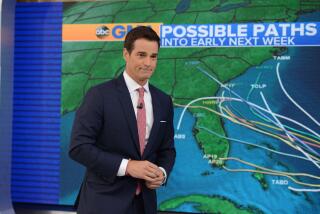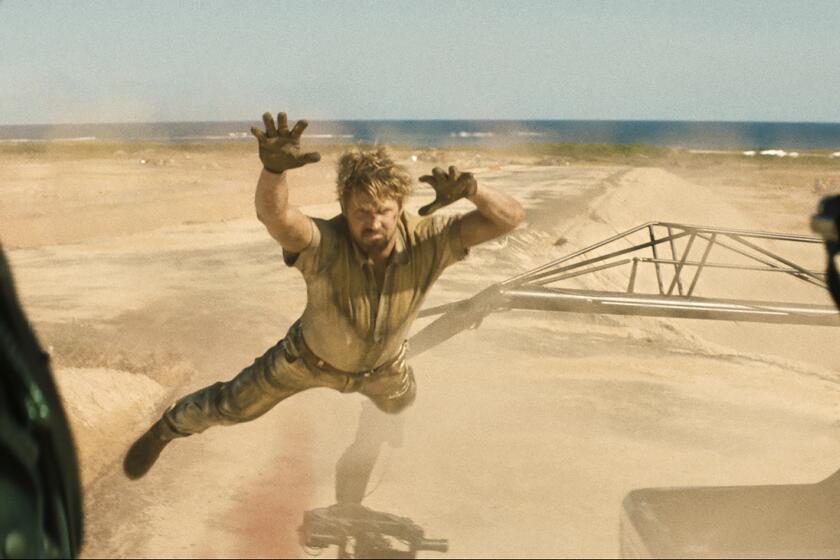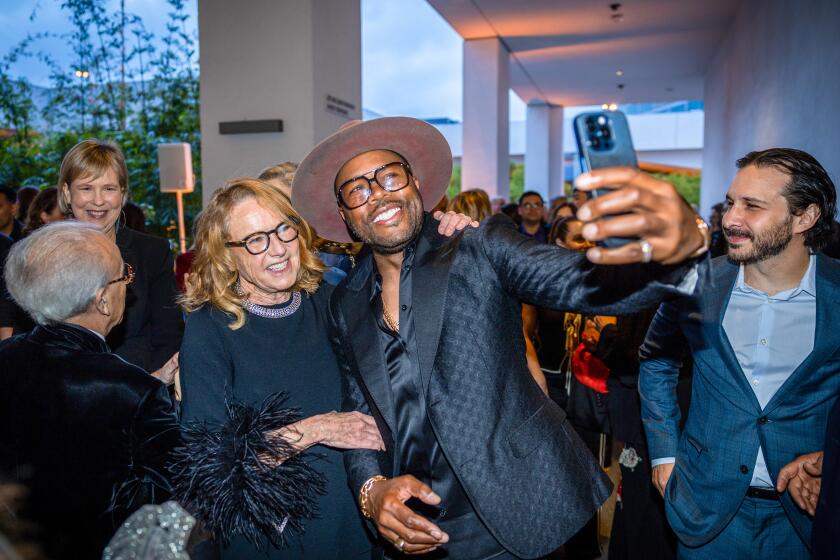How Hulk Crushed the Online Pirate
When Karen Randall received a phone call late one night and learned that an early, rough version of “The Hulk” had been pirated and posted on the Internet, one thought came to her mind.
“We are going to get them. We are going to get them, crush them, stop them,” said Randall, Vivendi Universal Entertainment’s general counsel.
On Wednesday, Randall got her wish.
Kerry Gonzalez, a 24-year-old New Jersey insurance underwriter, pleaded guilty in a Manhattan federal court to criminal charges of posting the bootlegged movie on the Internet. He could face a maximum sentence of three years in prison and a fine of $250,000 when he is sentenced Sept. 26 in U.S. District Court for the Southern District of New York.
Although scores of cases have involved consumers pirating movies online and in other media, this example of bootlegging was especially painful for Vivendi Universal, and marked the beginning of a potentially dangerous trend for the industry: consumers viewing a work in progress.
“The Hulk” burst into theaters June 20, earning $62.1 million its opening weekend amid mixed reviews. Ticket sales were high Friday, but by Saturday night they had drooped 12%, raising concerns about the film’s longevity.
The effect of the piracy -- and of the public panning that followed in Internet chat rooms and elsewhere -- on the box-office success of “The Hulk” is difficult to gauge, studio executives said.
“That early version of the film is available on nearly every peer-to-peer network,” Randall said. “It’s available on bootleg DVDs, on the streets of New York and in almost every country in the world.”
The studio turned to the Federal Bureau of Investigation for help soon after the piracy was discovered.
“A felony indictment is better than a civil settlement in our eyes,” said Jack Valenti, president of the Motion Picture Assn. of America. “This sends a very stern message to a lot of people out there who think stealing movies is high-reward and low-risk.”
Ad Agency’s Work Print
The winding trail leading to Gonzalez’s plea began in early June at a Manhattan advertising agency that was working on the marketing campaign for the Ang Lee movie, studio sources said Wednesday.
An acquaintance told Gonzalez that he had seen a copy of “The Hulk,” thanks to a friend who worked at the agency. The acquaintance asked Gonzalez whether he wanted to check it out, said Matthew Portella, Gonzalez’s defense attorney.
Gonzalez said that he did and soon had a videotaped copy of “The Hulk” work print. Officials with the FBI, who said the case remains open, declined to name the ad agency or the man who gave Gonzalez the tape.
At his home in Hamilton, N.J., Gonzalez slipped the tape into a digital scanner and made an electronic copy, according to court documents.
The two-hour work print -- the term used for such early copies of a movie in postproduction -- is dark in spots, shows details of the digital wires used to create the virtual Hulk and lacks a soundtrack. It also includes security tags -- unique markers on the top and bottom right-hand corners of the screen, as well as numerical strings embedded in the videotape.
Different markers are used each time studio officials make a copy of the work print. “That way, we can tell who’s got what copy,” said Rick Finkelstein, president and chief operating officer of Universal Pictures.
That information ultimately would help lead law enforcement officials to Gonzalez.
There were only a few early copies of “The Hulk.” Some were in the hands of the director and film editors, who were piecing together the movie. At least one was sent to the ad agency to be used as a basis for figuring out how to market the film, law enforcement officials said.
Gonzalez, who knew about the security tags, used a software program in an attempt to black them out. On June 6, he logged on to a Web site based in the Netherlands and, according to court records, allowed people to download the work print.
Within hours, the movie files had spread from the Netherlands, reaching peer-to-peer networks such as Kazaa and also Internet Relay Chat, a computer protocol that allows users to copy files from other computers at high speeds.
By the time Randall’s phone rang about 11:30 that same night, the damage had been done -- and it was spreading, as many fans and Internet movie viewers reacted negatively to an unfinished film.
Randall ordered quick action. Staff at Universal began tracking the bootleg movie on the Internet, the first step toward tracing the theft.
Early the next day, Universal Picture’s Finkelstein was eating breakfast as he scanned company faxes with glee. The night before, Universal’s “2 Fast 2 Furious” had opened with huge success. With “The Hulk” opening only weeks away, the summer looked wonderfully promising, a perfect setting for the studio’s corporate parent, who was courting buyers for its U.S. entertainment group.
Then the phone rang. It was Randall. They had a problem.
“There was a small group of executives who talked about what to do and how to deal with it over the weekend,” Finkelstein recalled. “We worked with an outside investigator and started doing the forensic work” on the file to try to uncover the blocked security tags.
By June 9, the studio said, it had contacted the Los Angeles office of the FBI. Within days, federal law enforcement officials had pieced together enough evidence to connect the bootleg to a New York ad agency, investigators said. At the same time, FBI officials tracked the copy through the Internet service providers that Gonzalez and others used.
But by then the rough version of “The Hulk” was being thoroughly panned. Hundreds of people flocked to chat rooms and Web sites to describe the film as “terrible” and “lame.” The studio was horrified that they were passing judgment on a film that was substantially different from what the final product would be.
While the Net was buzzing about the film, officials with the U.S. attorney’s office for the Southern District of New York and FBI investigators were narrowing their search for the pirate.
Gonzalez “found out through the grapevine that he was one of the suspects,” defense attorney Portella said. “He contacted me and surrendered himself on Wednesday,” June 18 -- two days before “The Hulk” officially opened.
Flaws in the System
Jerry Gibbons, executive vice president of American Assn. of Advertising Agencies in San Francisco, acknowledged that there are flaws in the security system for new films.
“It’s always difficult to have the kind of security protocols you would love to have,” he said. “The fact is, no matter where something like this ends up -- it could be the delivery boy -- advertising agencies take these kinds of security measures very seriously and do their very best to protect their clients.”
This isn’t the first time an eagerly awaited movie has hit the Internet before it was released to the big screen. “Spider-Man” appeared on the Internet one day before its theatrical debut and “Star Wars: Episode II Attack of the Clones” floated out a week early. More recently, online pirates were swapping copies of “The Italian Job” and “Finding Nemo” several days before the movies were officially released.
Although studios have stepped up their anti-piracy measures, it is impossible to prevent theft from occurring, said Paul Dergarabedian, president of Exhibitor Relations Co., a box-office tracking firm.
“To me it’s analogous to car theft,” he said. “If somebody really wants your car, they’re going to get it. Sadly, the same holds true for movies.”
*
Times staff writer Richard Verrier contributed to this report.
More to Read
The biggest entertainment stories
Get our big stories about Hollywood, film, television, music, arts, culture and more right in your inbox as soon as they publish.
You may occasionally receive promotional content from the Los Angeles Times.






